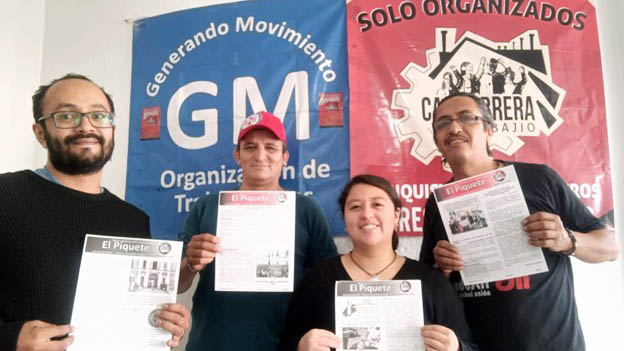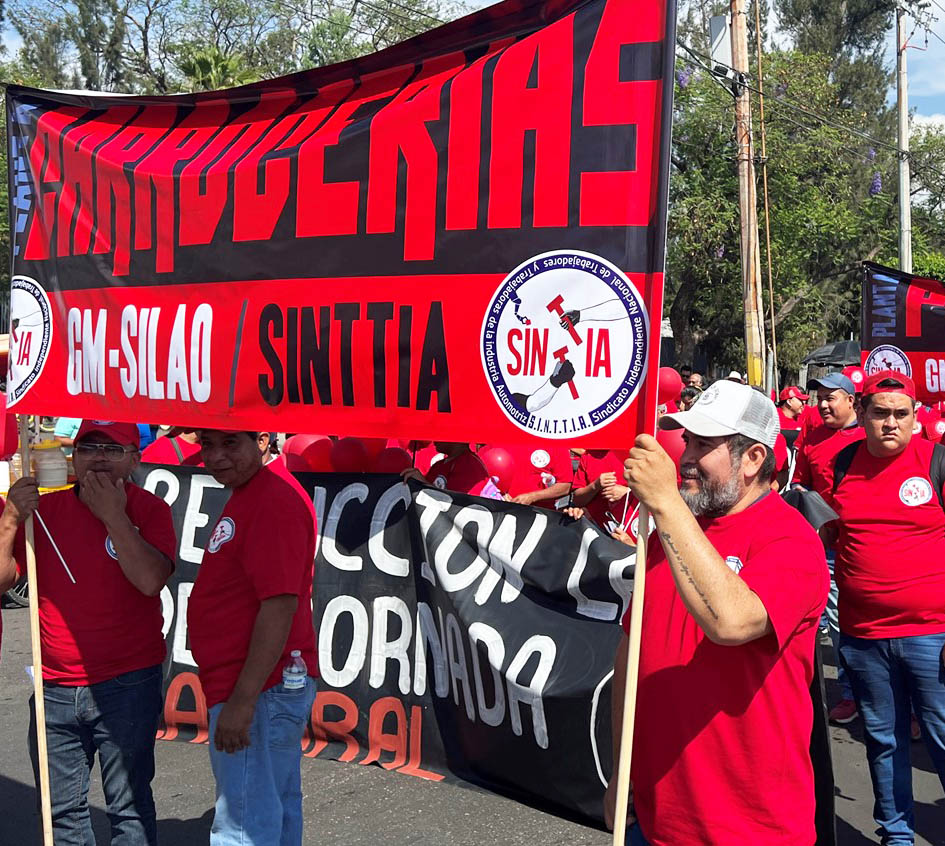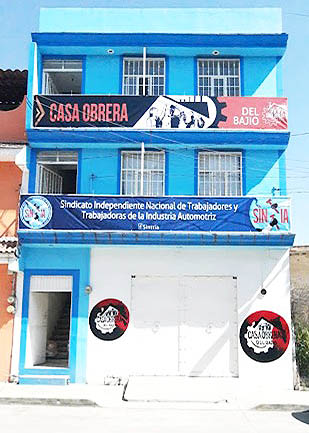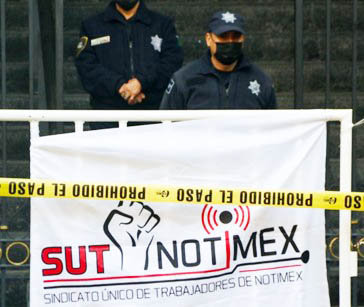|
|
|
|
The weekly newsletter of the México Solidarity Project |
|
|
|
Online at mexicosolidarityproject.org |
|
May 1, 2024/ Meizhu Lui, for the editorial team |
|
Because May 1 is a working class holiday (May Day is also known as International Worker's Day) we wanted to highlight Mexican workers, and so are re-printing last year's issue. |
|
|
A classic promotional piece for National Administrative Professionals’ Day |
|
May Day: How Best Can We Honor Workers? |
|
Can workers be honored when capitalists rule? In the US today, we currently have a National Administrative Professionals’ Day, what used to be known as National Secretaries Day. “Buy your secretary flowers” or “take your assistant out to lunch,” the day’s promoters urge. Spend money and feed capitalism! But give your admin staff a raise or adjust their hours so they can pick up their kids from school? Are you crazy!
Unlike most of the rest of the world, including México, the US doesn’t recognize May 1 as a day to honor workers, even though the day’s inspiration comes from the brutal suppression of workers in Chicago who went on strike to demand an eight-hour day in 1886. In 1887, President Cleveland chose instead to support a Labor Day holiday in September. He feared a May 1 date would strengthen socialist and anarchist movements.
But a nation’s recognition of May 1 as International Workers Day in and of itself doesn’t bring honor upon workers. Down through the years in México, for instance, May Day parades did nothing for workers except give them a chance to salute the political leaders complicit in their exploitation.
In this week’s issue, we hear from the staff of Casa Obrera del Bajío in the central Mexican city of Silao. These staffers remind us that workers need movements, not holidays. A little more than a year ago, they played a key role in the stunning triumph of a worker-led union at Silao’s giant GM plant.
Casa Obrera staff — and all those fighting to form democratic, independent Mexican unions — know that workers can’t expect anything more than a “thank you for lining our pockets” from our corporate overlords. So let’s all, on May Days to come, commemorate our martyrs, celebrate our victories, and organize to strengthen the international working class. Let’s do honor to ourselves and our struggle. |
|
|
|
For a deeper dive into current news and analysis in English, check out our media website. And definitely see the new English podcast ¡Soberanía! (Sovereignty) with José Luis Granados Ceja and Kurt Hackbarth. They entertain, while dismantling the lies and distortions about Mexico fed to us by the mainstream media. |
|
Don’t miss an issue! Sign up for a free Mexico Solidarity Bulletin subscription. |
|
|
|
|
|
Casa Obrera staffers Miguel Rodriguez, Israel Cervantes, Esmeralda Alonso Ibarra, and Arturo Bravo Guadarrama |
|
The Goal at Casa Obrera: Class Consciousness! |
|
Miguel Rodriguez worked 20 years in the graphics industry and picked up new skills along the way that have helped him focus on helping build the labor movement. Israel Cervantes started working at GM’s Silao plant in 2006 and co-founded the rank-and-file group that challenged the plant’s corrupt CTM union. Esmeralda Alonso Ibarra, the proud daughter of a GM Silao worker, believes worker struggles succeed when worker families participate in them. Arturo Bravo Guadarrama has been an activist ever since his student and faculty days. All four are now building worker power as staffers at the Casa Obrera del Bajío. We spoke with them all just before May Day, 2023. |
|
When did you first learn about the May 1 International Workers Day?
Israel Cervantes: It wasn’t until I was a worker myself that I learned about the 1886 Chicago general strike for the eight-hour day. I learned that the demonstrators had been fired upon and that four of them had been executed. Some 140 years later, at General Motors in Silao, the bosses imposed 12-hour shifts on us. We know those hours hurt our health. We still struggle for an eight-hour day.
Miguel Rodriguez: In the past on May Day, a national holiday in México, you were obligated to march if you worked in a plant with a CTM union. But the CTM never explained the day’s significance. This year, all of us at the Casa Obrera will march in the city of Irapuato to support telephone workers fighting to get rid of a corrupt charro union.
Esmeralda Alonso Ibarra: Taking to the streets on May Day couldn’t be more important. Demonstrating shows how united our working class is becoming. We’ll struggle united, on behalf of each other, because we know that workers in all jobs, regardless of the sector where they work, face labor injustices that must be eradicated.
Arturo Bravo Guardarrama: My first knowledge of May Day as Labor Day came in elementary school. Then in high school I saw a parade where workers from the CXTM, CROM, CROC — unions closely affiliated with the government — applauded government authorities. Later, as my political understanding grew, I realized that the march organizers had no real clue about the origins of May Day. In 2003, I was a leader of a public sector union, and we got the bureaucracy in our city of Queretaro to state that the May Day march aims “to commemorate those who bequeathed us our rights, at the cost of their lives.” |
|
At the Casa Obrera del Bajío, you’ve been supporting workers at the German-owned Fraenkische auto supply plant. How is the worker-led SINTTIA union organizing to wrest control from the plant’s corrupt CTM union?
Esmerelda Alonso Ibarra: Fraenkische is trying hard to keep SINTTIA out. Last year, the company gave every worker a 1,250-peso bonus, about $60, a joke. Then they fired 15 workers who were organizing against the CTM. |
|
|
May Day 2023 march in Irapuato/Photo: Bruce Hobson |
|
We’re helping the fired workers in their legal case and using social media and other communications to publicize what the company is doing. As a result of that work, some of the workers already have their jobs back.
Arturo Bravo Guadarrama: Our strategy at “Franki” is raising awareness among the workers, mostly through workshops. We’re also offering workers at the plant job-training courses. Workers have filed for a new union representation vote. Once we have a date for the vote, we’ll partner with workers inside the plant to push for a SINTTIA victory.
Israel: We keep worker spirits up with our own stories. We tell them how a small group of workers at the GM Silao plant formed the Generando Movimiento group and how GM fired the group’s organizers, me included. We tell them how we went on to create our own union, SINTTIA, and how SINTTIA has now become a national union. |
|
Your Casa Obrera, begun initially by México’s Center for Labor Research and Advocacy, has become SINTTIA’s base of operations as well as a worker center offering help to all workers. What services do you provide, and how do you function?
Miguel: We let people know their rights as workers. Many don’t know about the labor reforms now in effect within México or about the labor protections now available through the latest México-US-Canada trade agreement.
Our services all come free: classes on worker rights, political education on the history of class struggle, cultural activities like movie nights. And we teach communications skills. Whatever problems workers have, they know they can come to us for support. |
|
|
Esmerelda: To let people know about Casa Obrera and our services, we put up posters wherever people gather — at markets, on buses, in public spaces. We post on social media. Our monthly El Piquete newsletter — The Picket Line — informs workers about what sorts of help they can get at Casa Obrera, about the current situation in various workplaces, and about worker rights overall.
We also include information about worker struggles in other countries. In April, for instance, we printed a story about the rank-and-file caucus in the US auto union and its victory in securing the presidency of the UAW and many other top offices. We write El Piquete as a team. We get together to figure out what to write about.
We work as a team on lots of projects. Each of us four staffers has our own particular role — I’m the administrative staff person — but we plan and act together on everything.
The Morena party describes itself as pro-worker. What has the government done to help workers form genuine, worker-led democratic unions?
Israel: Unfortunately, we’ve seen a lack of support for workers’ movements. When the activist Susana Prieto came under house arrest for organizing maquiladora workers, when workers lost their jobs for opposing corrupt company unions, Labor Department officials didn’t show up to help. |
|
When workers went on strike for three years against Notimex, the public media outlet, the government didn’t negotiate. It shut down Notimex instead.
Yes, under new laws, worker votes must now legitimize contracts. But no genuine inspections are ensuring free and fair voting. We’re not against the federal labor secretary, Luisa Maria Alcalde. But someone else should have been appointed, someone who has lived the life of a shift worker, who knows our conditions first-hand. |
|
|
Photo: Nación321 |
|
Arturo: The Morena government has not done enough to help workers organize. The right to organize has become law under Morena, but workers don’t have the confidence that the law will guarantee that they can freely exercise that right. So, for the most part, the impunity and excesses of corrupt union leaders — in collusion with the bosses — remain.
Who do you think will make the best next president for the Mexican labor movement?
Miguel: The labor movement must stay separate from political parties. Combining the two has always historically ended up co-opting workers, keeping them subordinated to the party. Workers must continue organizing to improve our working and living conditions, with a view to strengthening our class nationally and internationally. We can’t expect any political leader to defend our interests. Regardless of who wins the presidency in 2024, we must remain independent. Our role will always be to inform and raise awareness, to organize and support the working class.
Arturo: I think that citizens need to become politicized and politics needs to become citizenized. “Worker/citizens” must get more interested in political campaigns. They need to understand each candidate’s vision and be able to vote for worker interests. And politics should generate mechanisms for worker participation in government projects.
At Casa Obrera del Bajío, we’re working to build a working class more critical, more participatory, and more demanding of its union reps, its employers, and its rulers, too! |
|
|
|
|
Our Hearts Sing Freedom: La Gloria de Cinco de Mayo |
|
|
Bill Gallegos, a veteran Chicano liberation activist, environmental justice leader, and revolutionary socialist, has a lot to howl about. |
|
|
Some poetic thoughts on an annual highlight of our year... |
|
Cada Cinco de Mayo … Brown hands hurriedly cutting/backs bent/skin scorched/dignity resting lightly on shovel.
El Aguila/flowing in an arc de Resistencia — piercing the seamless skies of Aztlan.
We are not the spoils of conquest/not meant to be chained/our bodies broken for CoolRay tycoons, drinking our life’s blood/on the fringes of ClubMed. |
|
|
|
We are the children of Cuahtemoc/ creators of awe and wonder/visionaries/life givers … desert artists singing sacred song.
You cannot defeat us — racists with bibles and guns!
También, we are the children of Puebla/souls fired like diamonds struck hard by the oppressive hands of decay/and a greed untouched by the tender stroke of humanity.
You cannot defeat us/our veins run with the blood of struggle/and a blessed fire. Our hearts sing a freedom song/even in the deathly cold and silence of your prisons.
Simón!! We are the children of Zaragoza, of Juarez, and Villa, of Zapata, Flores-Magón and Tennyuca/… soldadadas valientes de Cortina/
We are Mano Negra and Brown Berets/Mothers of East LA Streets. We are your worst nightmare — the true Calawala cabrónes.
For reals — we are the true Sueño de Las Américas. |
|
|
Recent news reports and commentaries, from progressive and mainstream media,
Guadalupe Correa-Cabrera, An Unwinnable Drug War Texas Observer. Corporations—criminal ones and legitimate multinational businesses—benefit from such armed conflicts (as the Drug War). The biggest winners were part of the “border security/military-industrial complex,” arms-producing firms and military contractors, large energy companies, and players in the financial markets. The biggest losers were Mexico’s industry of hydrocarbons and the Mexican people.
Alejandro Cavillo, Nestlé acusada, acusadora y el Ministro Aguilar Sin Embargo. “Nestlé hace lo posible para impedir que los consumidores tengan información sobre la calidad de sus productos oponiéndose a un etiquetado que se ha catalogado como uno de los más avanzados y que ha servido de modelo para varias naciones”.
Continuing Mexico’s Fourth Transformation Orinoco Tribune. “We are the only party that has declared its socialist character since our foundation, and we are going to push hard so that the next government led by Claudia Sheinbaum moves further to the left, goes more towards the most progressive positions and greater social development,” says Pedro Vázquez González, member of the National Coordination Committee of the Labor Party.
Viri Ríos, En defensa de reformar el amparo Milenio.Uno de los mecanismos de control más colosales que existen en México no fue discutido de forma democrática en los parlamentos que para ello existen, sino que es producto de las interpretaciones hechas por un puñado de jueces en respuesta a los argumentos que recibieron por parte de abogados privados.
Timothy A. Wise, Respect the Science Common Dreams. There is a mountain of evidence that both GM corn and its accompanying herbicides, including glyphosate, may cause serious health problems. The Mexican government is right to doubt U.S. assurances that GM corn is safe to eat given the lax regulatory processes for GM crops in the U.S.
Antonio Gershenson, Y mientras tanto, China y México avanzan La Jornada. Mientras otros gobiernos cuyos líderes han perdido la razón, como el ministro genocida de Israel, o el de Ucrania, Chad, Ecuador, El Salvador y muchos más, quienes se denigran ante sus pueblos, otros se abocan a consolidar el Estado de derecho con un sistema económico sano. China y México buscan soluciones para mejorar la calidad de vida de su población, a través del socialismo al estilo chino y del humanismo mexicano.
Mexico notches win in labor dispute over alleged violations at mine Reuters. The USMCA is up for review in 2026, and Mexican officials said they would look to fix the "asymmetries" in the mechanism under which the U.S. requested the review of the mine. The treaty allows only the U.S. to bring cases of suspected labor rights violations in Mexico, though Mexico is now looking to "employ it equally to defend migrant workers' rights" in the U.S. and Canada.
IECM censura a El Soberano por liderar batalla informativa contra Cártel Inmobiliario El Soberano. Después de una denuncia por Acción Nacional, la IECM tomó medidas cautelares contra El Soberano y funcionarios de Morena, en el que ordenan abstenerse de hablar de los vínculos del candidato de derecha a la presidencia de la Ciudad de México Santiago Taboada con el Cártel Inmobiliario.
Mexican lawmakers approve new pension fund backed by president Reuters. "I hope that on May 1, Labor Day, we can present a report to workers and give them the good news, that their pensions are guaranteed and that they will also be increased," Lopez Obrador said.
Alejandro Muñoz, La ciudad en disputa Sentido Común. La Ciudad de México encara en este proceso electoral dos proyectos totalmente antagónicos. Por una parte, Clara Brugada y la apuesta por poner en marcha el derecho a la ciudad como una realidad latente, y por otra Santiago Taboada y la corrupción del cártel inmobiliario. |
|
|
The Mexico Solidarity Project brings together activists from various socialist and left organizations and individuals committed to worker and global justice. We see the 2018 election of Andrés Manuel López Obrador as president of Mexico as a watershed moment. AMLO and his progressive Morena party aim to end generations of corruption, impoverishment, and subservience to US interests. Our Project supports not just Morena, but all Mexicans struggling for basic rights, and opposes US efforts to undermine organizing and Mexico’s national sovereignty.
Editorial committee: Meizhu Lui, Bruce Hobson, Agatha Hinman, Victoria Hamlin, Courtney Childs, Susan Weiss. To give feedback or get involved yourself, please email us! |
|
|
|
Subscribe! Get the México Solidarity Bulletin in your email box every week. |
|
|
|
Web page and application support for the México Solidarity Project from NOVA Web Development, a democratically run, worker-owned and operated cooperative focused on developing free software tools for progressive organizations. |











